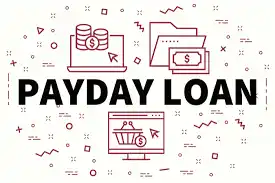Payday and Title Loans: Do They Truly Serve the Middle Class?

Financial challenges can arise unexpectedly, causing stress and anxiety for individuals and families alike.
Payday and title loans are two types of short-term borrowing options that have gained both attention and controversy.
While they might provide immediate relief to those facing urgent financial needs, the question remains:
Do payday and title loans genuinely serve the middle class, or do they perpetuate a cycle of debt?
In this article, we delve into the world of payday and title loans, examining their impact on the middle class and the broader financial landscape.
What is Payday Loans
Payday loans are short-term loans typically taken out by individuals who need quick access to cash, usually before their next paycheck arrives.
These loans are designed to be repaid in full when the borrower receives their next paycheck.
The ease of application and quick approval process make payday loans appealing to those facing emergencies, but their high interest rates and fees have raised concerns about their potential to trap borrowers in a cycle of debt.
Title Loans
Title loans, on the other hand, involve using a borrower’s vehicle title as collateral for a loan. The loan amount is usually a percentage of the vehicle’s value.
Title loans can be enticing due to their accessibility, but they also carry significant risks. If a borrower fails to repay the loan, their vehicle could be repossessed, causing further financial strain.
The Middle Class Dilemma
The middle class often finds itself caught between a desire for financial stability and the allure of quick fixes provided by payday and title loans.
While these loans might seem like a lifeline during emergencies, their high interest rates and fees can quickly lead to a cycle of debt that undermines the financial progress of the middle class.
Factors to Consider
1. Interest Rates and Fees
Payday and title loans commonly come with exorbitant interest rates and fees. For the middle class, already managing day-to-day expenses, these added costs can be burdensome and lead to a cycle of borrowing.
2. Debt Cycle
A major concern with payday and title loans is the potential for borrowers to get stuck in a cycle of debt. Borrowers who struggle to repay the loan on time might be forced to renew the loan, incurring additional fees.
3. Impact on Credit Score
Defaulting on payday and title loans can negatively impact a borrower’s credit score, making it harder for them to secure better financial opportunities in the future.
4. Lack of Financial Education
Some borrowers turn to these loans due to a lack of awareness about alternative financial options. Educating the middle class about budgeting, savings, and responsible borrowing is crucial to breaking the cycle of dependence on such loans.
FAQs
Are payday loans the only option for middle-class individuals facing emergencies?
No, there are alternative options such as personal loans from credit unions or community banks, and building an emergency fund.
Can payday loans improve a person’s credit score if repaid on time?
Payday loans are usually not reported to credit bureaus, so timely repayment might not have a positive impact on credit scores.
What steps can the middle class take to avoid falling into a cycle of debt with payday loans?
Middle-class individuals should explore other borrowing options, create a budget, and seek financial advice from experts to avoid the cycle of debt.
Are title loans a safer option than payday loans for middle-class borrowers?
Both title and payday loans come with risks. While title loans might offer larger amounts, the risk of losing one’s vehicle in case of non-repayment makes them equally risky. Exploring alternatives is advisable.





